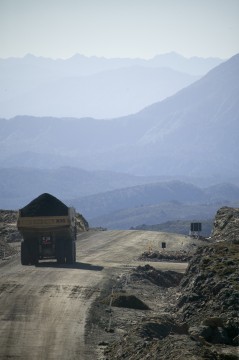Another day, another nail (in coal’s coffin)
Until a week ago, Solid Energy appeared to be the one of the prize jewels in the portfolio of state assets that the Government intended to sell. Now the company seems set to become a huge, slowly-dying albatross around taxpayer’s necks.
Here at Forest & Bird we don’t like the idea of dying albatross, metaphoric or otherwise. If Solid Energy were to go under, more than a thousand people would lose their jobs; more jobs again would be lost amongst those companies that contract to Solid Energy.
The Government is blaming Solid Energy’s investment in ‘alternative fuels’ as being a key reason why the company is failing. That’s like saying only that the Titanic was unsinkable, without mentioning the whole story.
In this context, the term ‘alternative fuels’ is misleading. Few of these ‘alternatives’ offered any kind of solution to the fact that all fossil-fuels contribute to climate change.
One of these projects involved setting fire to underground coal seams in the Waikato, and then trying to collect the gas that leaked from the mini-hell created below. It sounds in the telling like something that would have been dreamt up by a man wearing an animal skin, and carrying a club (a logical next step for Solid Energy would be to recreate the iron age Cerne Giant on the hills above Huntly).
Solid Energy’s other foray into ‘alternative fuels’ was a leap forward, but only as far as the 1940s, when the Germans were pushing to turn brown coal (the lowest quality coal there is, if that’s not an oxymoron) into diesel. Solid Energy also planned to create fertiliser, and convenient, planet-destroying briquettes, out of its Southland lignite. It intended to spend five billion doing so.
The company did invest in turning wood waste into fuel for domestic wood burners. And it did invest in bio fuels. But when the National Government scuppered the law that would have one day required all petrol and diesel to contain a small percentage of bio-fuel, the bottom fell out of that market (at the same time, the Government has been subsidising the deep sea oil industry to the tune of tens of millions of dollars, by carrying out deep sea seismic surveys).
The global recognition of CO2 as being a dangerous pollutant is not why Solid Energy is in trouble – though it would have only been a matter of time. The company is failing for several reasons, including the high New Zealand dollar, and the worldwide slump in demand for coal, as triggered by the GFC. But any company that relies on selling fossil fuels has no long-term future.
It has been increasingly looking as though Bathurst Resources’ plans to dig an open-cast coking coal mine on the pristine, publically-owned Denniston Plateau, also has no future (though the analysis Forest & Bird commissioned some time ago showed definitively that that was the case). Solid Energy has scaled back operations at its nearby Stockton coking coal mine, because of a fall in demand (coking coal is used to make steel), and that mine is already well-established.
Now there is yet another nail in coal’s coffin – and hopefully that of Bathurst’s aspirations. New Zealand Steel has just signed a contract with a company called Carbonscape, which will provide the company’s Glenbrook steel mill with trial quantities of bio-char, a carbon-neutral alternative to coking coal. Carbonscape has cleverly developing the technology to essentially microwave forestry waste, effectively speeding up the geological clock by millions of years, so avoiding the need to dig up the likes of unspoilt conservation land for a product that will release CO2 when burnt. The process even uses waste heat to generate the electricity needed to power it. Carbonscape says that it’s quite feasible to scale up the production process from pilot scale to industrial quantities …it just now needs the capital to do that.
Coal has no future, neither for Bathurst Resources, nor Solid Energy. Diversification – of the right kind – is exactly what is needed to save the big bird that is the state-owned enterprise. Without it, it will never soar.

